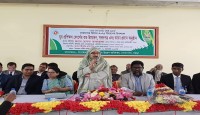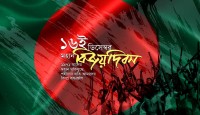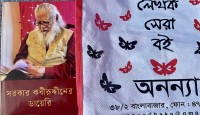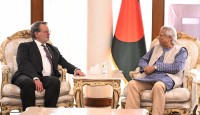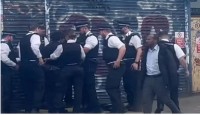Dhaka Bangladesh, March 2025: During the Eid journey, from March 20 to March 31, 227.49 million trips people may travel in various categories of public transport including road, rail, water and air for various needs including Eid markets in Dhaka and surrounding areas. An additional fare of 8.323 billion taka is being collected from these passengers in the name of Eid gratuity or additional fare. This information has emerged from an observation by the Passenger Welfare Association of Bangladesh (PWAB). At a press conference organized by the Passenger Welfare Association of Bangladesh (PWAB) at Dhaka Reporters Unity on March 26 morning, the organization's Secretary General Md. Mozammel Hoque Chowdhury presented the observation report on the collection of additional fares during Eid journeys. .jpg) The report said that 15 million people will go to their villages from Dhaka this Eid. In addition, additional trips will be made in various public transport for various needs, including Eid bazaars. Despite the various activities of various government agencies to ensure safe and smooth travel of these passengers as well as to stop the collection of additional fares, an additional fare of 832.3 million taka is being collected just for leaving Dhaka during the Eid journey this year. The members of the Bangladesh Passenger Welfare Association's Sub-Committee on Monitoring the Collection of Additional Fare in Public Transport presented this information this morning after monitoring the situation of the Eid journey by road, rail, water and air in the country since March 20 in Dhaka metropolis, the collection of additional fares and the overall condition of passenger services. The organization's observations show that although the government has fixed the daily fares for drivers, assistants and two Eid bonuses in determining the fares of buses, launches and various public transport, it is not effective in any transport in the country. As a result, 98 percent of public transport is being charged extra fares this Eid. Rising commodity prices, increased extortion in Eid-centric transport, providing additional expenses to transport companies, withdrawing Eid bonuses for transport owners, drivers, assistants and other support staff. Transport owners are grabbing extra profits, and for various reasons, public transport and private transport operated for rent are competing with each other for various reasons. Although there is a monitoring vigilance team for the collection of extra fares with road and waterway transport owners, no one is looking after the interests of passengers as these teams do not include passenger representatives.
The report said that 15 million people will go to their villages from Dhaka this Eid. In addition, additional trips will be made in various public transport for various needs, including Eid bazaars. Despite the various activities of various government agencies to ensure safe and smooth travel of these passengers as well as to stop the collection of additional fares, an additional fare of 832.3 million taka is being collected just for leaving Dhaka during the Eid journey this year. The members of the Bangladesh Passenger Welfare Association's Sub-Committee on Monitoring the Collection of Additional Fare in Public Transport presented this information this morning after monitoring the situation of the Eid journey by road, rail, water and air in the country since March 20 in Dhaka metropolis, the collection of additional fares and the overall condition of passenger services. The organization's observations show that although the government has fixed the daily fares for drivers, assistants and two Eid bonuses in determining the fares of buses, launches and various public transport, it is not effective in any transport in the country. As a result, 98 percent of public transport is being charged extra fares this Eid. Rising commodity prices, increased extortion in Eid-centric transport, providing additional expenses to transport companies, withdrawing Eid bonuses for transport owners, drivers, assistants and other support staff. Transport owners are grabbing extra profits, and for various reasons, public transport and private transport operated for rent are competing with each other for various reasons. Although there is a monitoring vigilance team for the collection of extra fares with road and waterway transport owners, no one is looking after the interests of passengers as these teams do not include passenger representatives.
The Passenger Welfare Association has observed that the largest number of passengers will be transported by water during this Eid. About 4 million passengers will travel to different destinations in the country on 200 small and large vessels through various ports including Sadarghat and Narayanganj river ports in Dhaka. Additional fares ranging from Tk 50 to Tk 1,000 per passenger are being collected depending on the class. If the additional fare is collected at an average rate of Tk 200 per passenger, an additional fare of Tk 800 million will have to be collected from these passengers before Eid. CNG-powered autorickshaws plying in the capital are facing anarchy over charging extra fares during Eid. During Eid, while using these autorickshaws for shopping, traveling to various terminals, as well as for daily activities, each passenger has to pay an additional fare of Tk 200 per trip. Before Eid, about 3 million passengers on 20,000 CNG-powered autorickshaws plying in the capital will have to pay an additional fare of more than Tk 600 million. Battery-powered rickshaws, easy bikes, and pedal-powered rickshaws are charging an average of Tk 20 per passenger as an additional fare in the name of Eid bakshis. The Passenger Welfare Association believes that about 80 million trips can be made by passengers on about 8 lakh easy bikes, battery-powered rickshaws, and pedal-powered rickshaws plying in the capital. Passengers will have to pay an additional fare of Tk 1600 million on these vehicles.
About 8 million trip passengers on 7,000 human haulers in the capital, known by names like Laguna, Duronto, Diganta, etc., will have to pay an average of about Tk 20 extra in the name of Eid gratuity before Eid. Accordingly, more than Tk 160 million will be collected in additional fares on Dhaka's human haulers alone. Private cars, jeeps and microbuses cost 20,000, while 60,000 trips require an additional fare of 3,500 taka on average. Accordingly, passengers using this transport will have to pay an additional fare of 210 million taka. This Eid, 3 million passengers will have to pay an additional fare of Tk 300 per passenger for the journey of buses and minibuses on long-distance routes from Dhaka. Accordingly, bus and minibus passengers on long-distance routes will have to pay an additional fare of Tk 900 million. Every year, city bus services operating in Dhaka city collect a fare of Tk 50 per passenger for any destination from 2 days before Eid in the name of Eid gratuity. This time too, if 4 million passengers are charged an additional fare of Tk 30 per passenger on 3,000 city buses in Dhaka in the 2 days before Eid, the passengers will have to pay an additional fare of Tk 120 million in this sector. To avoid public transport crisis, excessive fare collection, not getting tickets on time, traffic jams and other hassles, around 2.5 million passengers are going to their village homes on motorcycles this Eid. 30 percent of them are using their own bikes. In Dhaka city alone, the 500,000 ridesharing motorcycles are charging an average of Tk 100 more per passenger than usual. This is an additional Tk 2.5 billion for 25 million trips. Every year, despite various measures taken to prevent the transportation of passengers on the roof of trains during Eid, a large number of low-income people continue to travel as passengers on the roof of trains at low cost, risking their lives.
This Eid, 80,000 passengers from Dhaka will go home on the roof of trains. Each of them will have to pay an average of at least 100 taka to bribe 8 million taka to railway officials. Another 250,000 passengers will travel without tickets in the dining car, engine, between two compartments, and inside the coach. TTEs, guards, government and private stewards working on trains, people from private canteen operators, GRP, NRB on duty on trains, and ticket checkers on duty at stations will have to pay a bribe of 75 million taka at an average of 300 taka per passenger. The festival of collecting additional fares on government and private flights has been going on since 10 days before Eid. On some routes, double or triple the fares are being collected. This Eid, at least 1 lakh passengers are using domestic routes, charging an average of Tk 3,500 extra fare per passenger, which is Tk 350 million extra fare. On the occasion of Eid, the ghat lessees collect a fee of 5 taka from the general public for water transport and ferry crossings at various launches and piers, including Sadarghat river port, at the rate of 10/20 taka. During this time, a coolie wage charge of 500 to 1000 thousand taka is demanded for ferry crossings or boarding launches with goods. A fee of 100 thousand taka is demanded for each packet of Eid bazaar at the pier. The observation of the Passenger Welfare Association has shown that 100 millions passengers will travel on ferry crossings around Sadarghat and Narayanganj river ports this Eid. These passengers are harassing passengers by collecting an additional ghat fee of 1 billion taka at the rate of 10 taka per head, while the private lessees and corrupt officials of BIWTA are sponsoring these lootings. More than 8.323 billion taka of additional fare is being collected for internal travel in Dhaka city and Eid journeys from Dhaka to different districts of the country alone. If we take into account all the metropolitan cities across the country including inter-district, it will increase tenfold. Due to such additional fare anarchy, prices of goods, extortion, social unrest, irregularities-corruption, chaos in transport and road accidents are increasing. Low-income people are suffering.
To overcome this, it is important to introduce digital fare collection in public transport, stop cash transactions, introduce prosecution using CCTV cameras on roads and highways, and ensure good rule of law. Also present were the newly elected chairman of the organization, former secretary of the Bangladesh Election Commission, Dr. Mohammad Zakaria, organizing secretary and former executive director of the Dhaka Transport Coordination Authority, Syed Ahmed, finance secretary Mahmudul Hasan Russell, publicity secretary Mohammad Alauddin Masud, executive committee members and principals of Dhaka Ispahani Public School and College, Rafika Afroz, and Mohammad Arif, among others.



.jpg)

